|
|
|
Sort Order |
|
|
|
Items / Page
|
|
|
|
|
|
|
| Srl | Item |
| 1 |
ID:
119662


|
|
|
|
|
| Publication |
2013.
|
| Summary/Abstract |
Sub-Saharan Africa's GDP has grown five percent a year since 2000 and is expected to grow even faster in the future. Although pessimists are quick to point out that this growth has followed increases in commodities prices, the success of recent political reforms and the increased openness of African societies give the region a good chance of sustaining its boom for years to come.
|
|
|
|
|
|
|
|
|
|
|
|
|
|
|
|
| 2 |
ID:
162602


|
|
|
|
|
| Summary/Abstract |
Professor Alan Maynard applied both his wit and wisdom to the analysis of health care and health policy for over five decades. As a leading health economist, he made an immense contribution to the analysis and understanding of many of the key issues that are still at the heart of the current debates about the National Health Service. His academic interests were wide ranging, including health systems and reform, performance, workforce, regulation, public health and the pharmaceutical industry. Alan's natural ability to communicate with varied audiences established the relevance of health economics thinking and language to policy and practice, both nationally and internationally.
|
|
|
|
|
|
|
|
|
|
|
|
|
|
|
|
| 3 |
ID:
185749
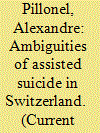

|
|
|
|
|
| Summary/Abstract |
This article aims to highlight the particularity of assisted suicide in Switzerland. Compared with other contemporary forms of dying around the world, which are mainly medicalized, the implementation of assisted suicide in Switzerland is carried out by volunteer associations. The political culture pertaining to assisted suicide reflects the reluctance of medicine to recognize the practice. But its legitimacy is not only a question of justice and rights. It is based on a process of social recognition, advanced by a citizen’s movement, and debated in the public sphere. Through the history of one particular francophone association for the right to die with dignity, the article examines the Swiss way of regulating this manner of dying.
|
|
|
|
|
|
|
|
|
|
|
|
|
|
|
|
| 4 |
ID:
160091


|
|
|
|
|
| Summary/Abstract |
The Military Compensation and Retirement Modernization Commission was established by the Congress in 2013 to perform a systematic review of military compensation to address rising costs and other trends. Their recommendation for reforming the TRICARE health care program was sweeping, and differed greatly from earlier proposals that focused on increasing beneficiary cost shares. Specifically, the commission proposed overhauling the current benefit delivery model and replacing it with a premium-based insurance model offering a menu of DoD-sponsored private health plans. The analysis presented here is based on work that supported the commission by estimating the budgetary impact of its proposed reforms. Results indicate that movement towards the premium-based model would produce an annual budgetary cost savings in the $2 billion to $4 billion range, with a best savings estimate of $3.2 billion.
|
|
|
|
|
|
|
|
|
|
|
|
|
|
|
|
| 5 |
ID:
092526
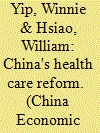

|
|
|
|
|
| Publication |
2009.
|
| Summary/Abstract |
China has recently unveiled an ambitious new health-care reform plan, entailing a doubling of government health spending as well as a number of concrete reforms. While the details of the plan have not yet been completely announced, we offer a preliminary assessment of how well the reform is likely to achieve its stated goal of assuring every citizen equal access to affordable basic health care. The reform is based on three fundamental tenets: strong role of government in health, commitment to equity, and willingness to experiment with regulated market approaches. Within this framework, the reform offers a number of laudable changes to the health system, including an increase in public health financing, an expansion of primary health facilities and an increase in subsidies to achieve universal insurance coverage. However, it fails to address the root causes of the wastes and inefficiencies plaguing China's health care system, such as a fragmented delivery system and provider incentives to over-provide expensive tests and services. We conclude that China should consider changing the provider payment method from fee-for-service to a prospective payment method such as DRG or capitation with pay-for-performance, and to develop purchasing agencies that represent the interests of the population so as to enhance competition.
|
|
|
|
|
|
|
|
|
|
|
|
|
|
|
|
| 6 |
ID:
174831


|
|
|
|
|
| Summary/Abstract |
Military veterans and their families face a multiplicity of challenges once they transition from service. Even though more American private and public-sector organizations are engaged in studying the needs of veterans and their families through need assessments, few assessments are comprehensive analyses of the challenges they face. This systematic review of 61 need assessments from 2007-2018 in the United States summarizes findings on 18 veterans issues. While most studies addressed issues relating to accessing U.S. Department of Veterans Affairs health and benefit services, mental health, employment, and homelessness, gaps in the literature emerged, particularly regarding ethnic and sexual minority, rural and elderly veterans, and National Guard/Reserve servicemembers. Large cities and states with varying degrees of military presence were frequent regions of study, with national think tanks, nonprofit organizations, and public universities conducting most need assessments. Future assessments should address persistent inequities in coverage among communities and topics of study using mixed-method research and survey design.
|
|
|
|
|
|
|
|
|
|
|
|
|
|
|
|
| 7 |
ID:
130400
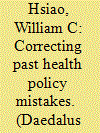

|
|
|
|
|
| Publication |
2014.
|
| Summary/Abstract |
China's health policy in the 1980s followed its economic policy of marketization. China shifted health financing from public to private and commercialized the country's public health services. Unwittingly, the Chinese government did not grasp the serious market failures in health care, which resulted in a profit-driven public health service in which patients pay directly for services. China's health policy created three major unintended consequences: disparity between rural and urban residents, poor quality of health care, and rapid inflation in health expenditures. Since 2003, China has tried to correct its policy mistakes through public financing and by establishing social health insurance. However, strong profit motives have become embedded within the culture of medical professionals and have eroded the professional ethics that prioritize medical practices for patients' benefits. Restoring medical ethics is a formidable challenge. This paper analyzes the transformation of the Chinese health system and its ongoing challenges.
|
|
|
|
|
|
|
|
|
|
|
|
|
|
|
|
| 8 |
ID:
190361


|
|
|
|
|
| Summary/Abstract |
The COVID-19 pandemic response in West Africa has been shadowed by the legacies of colonial-era approaches to disease control.
|
|
|
|
|
|
|
|
|
|
|
|
|
|
|
|
| 9 |
ID:
174850


|
|
|
|
|
| Summary/Abstract |
The COVID-19 pandemic has taken a devastating toll on the lives of older adults, intensifying long-standing challenges in the US health care system. Persistent health and mortality disparities on the basis of race and socioeconomic status, staffing shortages and insufficient financial resources at some nursing homes, and a reluctance among Americans to make formal plans for their end-of-life health care are problems of heightened magnitude in the pandemic era. Policy solutions like extending Medicare benefits to younger people, increasing Medicaid reimbursement rates, and facilitating formal conversations regarding end-of-life care may help Americans to age and die with dignity.
|
|
|
|
|
|
|
|
|
|
|
|
|
|
|
|
| 10 |
ID:
189702
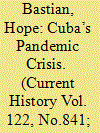

|
|
|
|
|
| Summary/Abstract |
The COVID-19 pandemic has compounded a crisis of legitimacy for Cuba’s first leader of the post-Castro era. The initial pandemic response, relying on lockdowns, was effective but worsened the country’s economic problems. Then a wave of infections driven by a new variant of the virus overwhelmed the celebrated public health system. Instead of acknowledging citizens’ sacrifices and grievances, the government has sought to discredit dissent. But there have been protests of unprecedented scale, and hundreds of thousands of Cubans have left the country since the borders reopened in late 2021.
|
|
|
|
|
|
|
|
|
|
|
|
|
|
|
|
| 11 |
ID:
078280
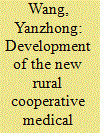

|
|
|
|
|
| Publication |
2007.
|
| Summary/Abstract |
Based on a survey conducted by our research team at the Chinese Academy of Social Sciences, the present paper reports on the development of China's new rural cooperative medical system set up in late 2002. The new rural cooperative medical system is different from the old system in that it is organized, guided and supported by the government but that rural residents voluntarily participate in its administration. It is financed by individuals, collectives and the government. The new cooperative medical system focuses on serious disease planning and mutual aid and fraternity between rural residents in health care. The results of our survey indicate that the new rural medical system has been successful up to now but that it also has some problems. China needs to pay more attention to overcoming the difficulties and challenges it faces in terms of future medical needs so that a mechanism for its sustainable development can be established
|
|
|
|
|
|
|
|
|
|
|
|
|
|
|
|
| 12 |
ID:
189164
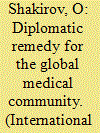

|
|
|
|
|
| Summary/Abstract |
IN MARCH 2021, most UN member states recognized the special importance of protecting health care infrastructure from cyber threats. A point to that effect was included in the final report1 of the Open-ended Working Group (OEWG) on developments in the field of information and telecommunications in the context of international security, a negotiation format launched in 2018 on Russia's initiative. The report reflects progress achieved at the UN and in other formats during more than two decades of debate on cybersecurity and information security in general,2 but it was the first UN document to include a separate section on the health care aspect of international information security. The fact that the report was passed by a consensus vote is an indication of the importance of this issue.
|
|
|
|
|
|
|
|
|
|
|
|
|
|
|
|
| 13 |
ID:
180076
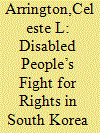

|
|
|
|
|
| Summary/Abstract |
Long considered objects of pity and welfare assistance, people with disabilities in South Korea and Japan are increasingly treated as rights-bearers. Through activism, litigation, and involvement in international treaty negotiations, Koreans and Japanese with disabilities spurred reforms that created new anti-discrimination protections and obligations to provide reasonable accommodations, access, employment, and social supports. These policy changes also signal a notably more legalistic approach to governance, particularly in South Korea, because they include more detailed rules and formal rights, more enforcement mechanisms like fines, and better recourse to judicial or other dispute resolution bodies.
|
|
|
|
|
|
|
|
|
|
|
|
|
|
|
|
| 14 |
ID:
187179


|
|
|
|
|
| Summary/Abstract |
The COVID-19 pandemic has presented lessons on using health data to improve, save, and protect lives, and the need to improve the stewardship of health privacy. Before the pandemic, the United States already had a broken health data system, fragmented and dominated by public-private partnerships in which the businesses involved sought to commercialize patient data. More than two years into the pandemic, in many respects health data privacy is even more fractured and prone to being misused to profiteer and to harm rather than help the most vulnerable. Health data is now being used by law enforcement to criminalize abortion and undocumented immigration, making reform an urgent necessity.
|
|
|
|
|
|
|
|
|
|
|
|
|
|
|
|
| 15 |
ID:
124518
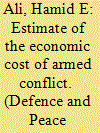

|
|
|
|
|
| Publication |
2013.
|
| Summary/Abstract |
There has been much debate in many forums to seek a settlement of the Darfur conflict (DC), but no study has addressed its economic cost. This study is the first attempt to quantify the economic cost of the DC. The war's costs include the destruction of infrastructure, direct military spending attributable to the war effort, and the impact of the latter on capital formation. In addition, the human destruction - loss of life and income - must be taken into account. Our calculations show that the government of Sudan has incurred costs totaling US$30.5 billion, equivalent to 171% of 2003 Gross Domestic Product GDP, on the war in Darfur. This includes $10.1 billion in direct military expenses; $7.2 billion in the lost productivity of internally displaces persons; $2.6 billion in foregone lifetime earnings of the dead; $4.1 billion in infrastructure damage; and $6.5 billion in war impacts on GDP. The total costs of the war are $41.5 billion if we added military spillover and African Union/UN hybrid operation in Darfur peace-keeping operations of $10.9 billion. While the country has spent only 1.3% of its budget on public health and less than 1% on education over the past two decades. The war consumes 13% of GDP in a society that lacks the means to provide the basic entitlements of education, food, health care, and shelter to its people.
|
|
|
|
|
|
|
|
|
|
|
|
|
|
|
|
| 16 |
ID:
187175
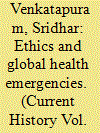

|
|
|
|
|
| Summary/Abstract |
The global response to the COVID-19 pandemic has been marred by a widespread failure to embed ethics in policymaking. The consequences have included vaccine hoarding by rich countries and the deaths of millions of people around the world. Governments have followed a simplistic narrative of science and finance teaming up against a virus and delivering a silver bullet in the form of a new vaccine, rather than recognizing that a health emergency reflects patterns of inequality within and across countries and other social factors that need to be addressed. Given the interconnection and interdependency of globalization, ethics must be incorporated in global health policy as a primary consideration, not an afterthought.
|
|
|
|
|
|
|
|
|
|
|
|
|
|
|
|
| 17 |
ID:
127924
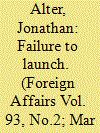

|
|
|
|
|
| Publication |
2014.
|
| Summary/Abstract |
President Barack Obama has often said that his proudest domestic achievement is the passage of the Patient Protection and Affordable Care Act (commonly known as the ACA or Obamacare). The sprawling law, pushed through Congress in 2010 in the face of fierce Republican resistance, made numerous important changes to the U.S. health-care system -- a system so big that, on its own, it represents an economy about the size of France's.
|
|
|
|
|
|
|
|
|
|
|
|
|
|
|
|
| 18 |
ID:
117080
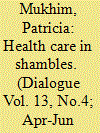

|
|
|
| 19 |
ID:
119190
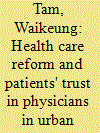

|
|
|
|
|
| Publication |
2012.
|
| Summary/Abstract |
The Chinese health care system has experienced profound changes in recent decades, including the retrenchment of government financial support. These changes and their subsequent adverse impacts have prompted the Chinese media and some academics to suggest that patients have a relatively low level of trust in physicians in China today. As the first step in exploring the state of patient trust in physicians in public hospitals in urban China, and its determinants, we conducted a survey of 434 patients from 26 public hospitals in urban Beijing between December 2009 and January 2010. Conducted by the Horizon Research Group, our survey asked the patient respondents how they viewed the physicians they were currently seeing, focusing on the following dimensions of trust: physician agency, technical competence, interpersonal competence, and information provided by physicians. Our survey results show a relatively high level of patients' trust in their physicians. Moreover, our in-patient respondents reported a higher level of trust than out-patient respondents with regard to physician agency, interpersonal competence and information provision. Regression analyses also find that patients' self-reported health status, the level of public hospitals from which they received treatment, the duration of their illness, and the frequency of exposure to negative media reports of physicians and hospitals are important determinants of patients' trust in physicians.
|
|
|
|
|
|
|
|
|
|
|
|
|
|
|
|
| 20 |
ID:
184234


|
|
|
|
|
| Summary/Abstract |
Putnam’s seminal work on social capital focused on early forms of health insurance as both a result, and accelerator, of the norms of reciprocity and social trust that foster cooperation. Yet, while social capital has been studied as a factor supporting community-based health insurance in developing countries, there has been no analysis of its role in U.S. health insurance. With repeal of the mandate to carry health insurance, this product is once again a purely voluntary purchase, and bears analysis as a cooperation problem. Putnam later documented a sharp decline in social capital in the United States. If social capital undergirds participation in health insurance, we can expect reduced reciprocity to lower willingness to cross-subsidize the sick. Waning social capital could also manifest itself in reduced trust that other healthy people will purchase insurance and lack of trust in the providers and manufacturers who make claims on the insurance pool.
|
|
|
|
|
|
|
|
|
|
|
|
|
|
|
|
|
|
|
|
|